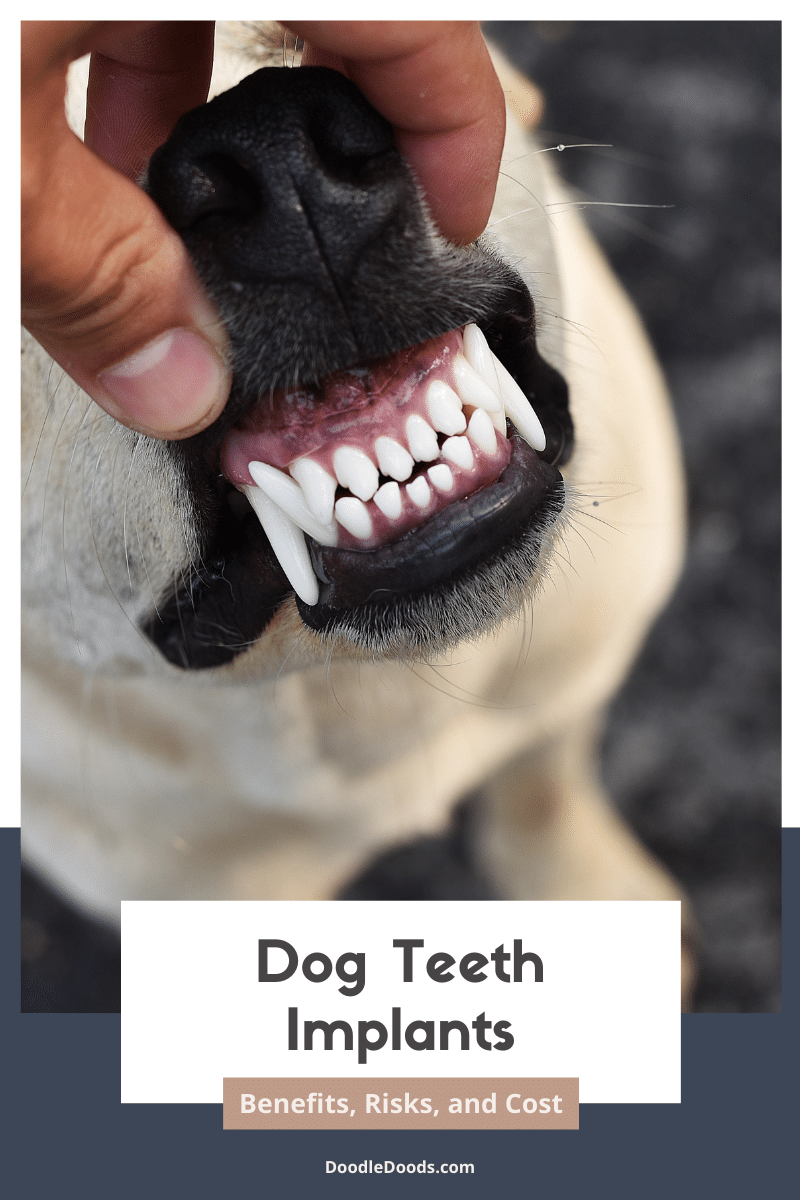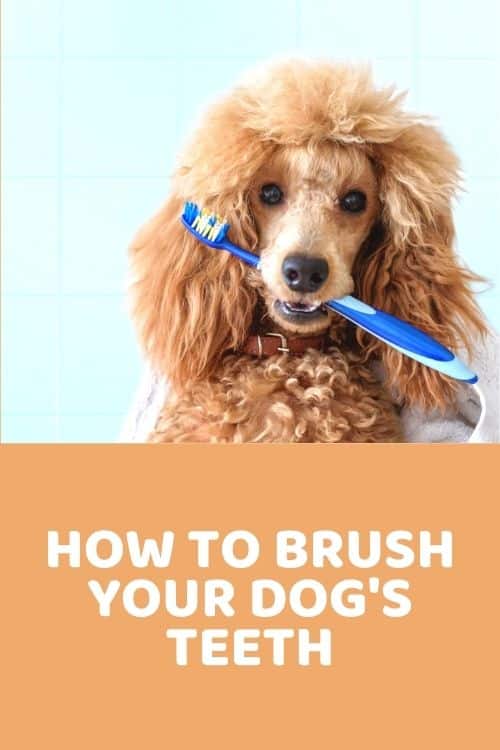If you’ve ever wondered what all the fuss is about dog teeth implants, then you’ve come to the right place. In this guide, we’re going to learn what exactly are teeth implants for dogs, whether they’re worth it or not, which dogs are good candidates for them, and everything and anything else you should know about dog teeth implants. Keep on reading to learn more!
Table of Contents
- Dog Teeth Implants: Intro
- What Are Dog Teeth Implants And How Do They Work?
- Are There Any Benefits Of Dental Implants For Dogs?
- How Risky Is Dental Surgery For Dogs?
- What Is The Average Cost Of Dog Teeth Implants?
- Are Dental Implants For Dogs Covered By Pet Insurance?
- Vet-Recommended Tips To Keep Your Dog’s Teeth Healthy
- Dog Teeth Implants: FAQs
- Dog Teeth Implants: Final Thoughts
Dog Teeth Implants: Intro
We’ve all heard how dental implants can be wonderful for people who have severe dental issues or missing teeth. But dog teeth implants?! Is this even a real thing? And are they worth it?
As you can probably guess by the title of this article, dental implants for dogs are a very real thing. Although not as widely available or popular as human dental implants, dog teeth implants have been developed for the very same purpose. Thanks to the advancements of veterinary medicine, there are new and innovative things developed to suit our canine pals more and more frequently.
But are teeth implants for dogs actually worth it and can they even make a difference? What about the risk of dog dental implants and the costs? That’s exactly what we’re going to find out in this guide.
What Are Dog Teeth Implants And How Do They Work?
Dog teeth implants, also known as dental implants for dogs, are a relatively new development in veterinary dentistry. These implants replace missing or severely damaged teeth, restoring function and aesthetics for dogs with dental issues. Just like dental implants for humans, we might add. Although for humans dental implants also help with the visual side of things, for dogs dental implants are usually only inserted if it’s necessary for their health and wellbeing.
The process is lengthy and requires quite a few, invasive steps, and it usually takes multiple visits to get your pup dog teeth implants. Essentially, if your dog is a suitable candidate for dog teeth implants, a veterinary dentist will surgically insert a titanium or ceramic post into your dog’s jawbone. This serves as an artificial tooth root to hold the implant in place. After the implant has integrated with the bone, a custom-made dental crown is attached to the post, mimicking the appearance and function of a natural tooth.
Here’s how the process typically works:
- Consultation: A veterinary dentist will first examine your dog’s teeth and mouth to determine whether or not your dog is a good candidate for dental implants. This usually includes an X-ray and other diagnostic tests.
- Preparation: If your dog has been given the green light for dog teeth implants, it will require proper preparation before inserting the dental implant or implants. Before the surgery, your dog may require tooth extraction or other procedures to prepare the jaw for the implant.
- Surgery: Once the jaw is prepared for the surgery, your veterinary dentist will surgically place a titanium screw into the jawbone. This is done under general anesthesia to minimize risks and complications, but also to reduce your dog’s discomfort and have them still for the duration of the surgery.
- Healing and integration: After the surgery, the implant needs time to integrate with the jawbone. This can take several weeks to a few months, depending on how quickly your dog’s body can heal itself after the surgery.
- Crown placement: Once the implant, a.k.a screw has integrated with the jawbone, your veterinary dentist will attach a custom-made dental crown to the implant.
- Aftercare: Although your dog’s dental implant is now in place, it doesn’t stop there. Regular dental check-ups and at-home dental care are essential to maintain the health and longevity of your dog’s new dental implant.
Are There Any Benefits Of Dental Implants For Dogs?
Dog teeth implants can significantly improve your pet’s quality of life, especially if they have difficulty eating or experience pain due to missing or damaged teeth. However, this procedure is not suitable for every dog, and it can be very-very costly.
In addition to that, there’s currently conflicting scientific evidence about the actual benefits of dog teeth implants. With humans, we already know that dental implants can drastically improve our quality of life as well as prevent any further dental issues. However, with dogs it’s a bit more difficult to point out the actual benefits.
Nonetheless, one of the most notable benefits of dog teeth implants is that they’re designed to prevent bone loss. When a tooth is missing, the jawbone in that area can start to deteriorate drastically. This in turn will weaken the jawbone and can lead to a whole range of other issues. Basically, dog dental implants act as artificial tooth roots, providing the necessary stimulation to maintain healthy bone density and prevent further bone loss.
Still, there isn’t enough scientific evidence to claim that dog teeth implants are actually beneficial and can deliver the promised results as in humans. There are also potential risks and complications involved, as with any invasive medical procedure.
Other Potential Benefits Of Dog Teeth Implants
Teeth implants for dogs may also deliver other potential benefits for our four-legged best pals. For instance, dental implants can restore a dog’s ability to chew and bite properly, which can significantly improve their overall quality of life, particularly if they have been struggling with eating due to missing or damaged teeth. That can be especially helpful for pups that are used to eating dry kibble – as most dogs are.
By the way, one significant benefit of dry kibble is that it helps prevent plaque and tartar buildup. And if your pup cannot continue eating their usual kibble, it could lead to other dental issues in the long run.
Additionally, as damaged and infected teeth can cause severe pain and discomfort for your dog, dog teeth implants can help minimize those issues. On the other hand, the process of having dental implants inserted and the subsequent recovery will likely cause pain as well.
It’s also up for debate whether or not missing teeth can cause neighboring teeth to shift out alignment – this could potentially lead to bite problems. Dental implants for dogs might help maintain proper alignment and reduce those issues. Still, it’s not been scientifically proven just yet.
And while aesthetics may not be the main concern for most pup parents, dental implants can improve the appearance of your dog’s mouth by filling gaps left by missing teeth. But we must say that even if your pup has a few missing teeth, it won’t make them any less cute! At the end of the day, dog teeth implants should only be inserted if there’s a strong need for it to maintain or improve your dog’s overall health and wellbeing.
How Risky Is Dental Surgery For Dogs?
Like any surgical procedure, dental surgery for dogs comes with a certain set of risks. However, with advancements in veterinary medicine and proper precautions, these risks can be minimized. Some potential risks associated with dental surgery for dogs include:
Anesthetic Complications
Dogs, especially older ones or those with pre-existing health conditions, may experience complications related to anesthesia. However, a thorough preoperative examination, including bloodwork and other tests, can help identify potential issues beforehand.
Infections
As with any surgery, there is also a risk of infection. Veterinarians take precautions, such as maintaining a sterile environment and administering antibiotics, to minimize this risk. Nonetheless, it’s not uncommon for the surgical site to become infected in certain cases.
Bleeding
Excessive bleeding can happen during or after dental surgery. Or any surgery for that matter. Usually veterinarians monitor blood loss closely during the surgery and use various techniques to control and minimize the bleeding. In very rare cases, a blood transfusion might be necessary.
Damage To Surrounding Tissues And Nerves
During dental surgery, there is a possibility of accidental damage to nearby teeth, gums, nerves, or other oral tissues. Skilled veterinary dentists take great care to minimize those risks. But as dog dental surgery requires extreme precision, these complications can happen from time to time.
Post-Operative Complications
Like humans, dogs may experience pain, swelling, nerve damage, or other complications after dental surgery. Indeed, some pain and swelling is completely normal after the surgery. However, sometimes it could become a persistent issue or cause severe pain for your dog. Following proper pain management and aftercare instructions from your vet can help prevent those problems. Nonetheless, sometimes those complications just happen and there’s nothing you can do to prevent them.
Although some dogs do experience complications after dental surgery, there are steps you can take to minimize those risks, including:
- Choose a reputable and experienced, board certified veterinary dentist.
- Ensure your dog undergoes a thorough pre-operative examination.
- Follow all pre and post-operative instructions provided by your veterinarian.
- Maintain regular dental check-ups, vet visits, and at-home oral care to prevent dental issues.
What Is The Average Cost Of Dog Teeth Implants?
Dog teeth implants are expensive, there’s no doubt about it. But the overall cost of dog dental implants depends on numerous factors and how many implants your dog needs. Of course, the complexity of your dog’s case will also play a role here, including how many additional procedures your pup will need before and after the insertion of the implant.
Another thing to consider is your veterinary dentist’s location, reputation, and experience. For instance, in certain states this complex procedure could be significantly cheaper than in some other states. Likewise, expect to pay more at veterinary clinics that have a proven track record and board certified veterinary dentists.
On average, a single dental implant for dogs can range from $1,500 to $3,000, even beyond that. This cost typically includes the surgery, anesthesia, the implant itself, and the custom-made dental crown. Additional expenses, such as consultations, follow-up appointments, medications, or other treatments, may not be included in this estimate. But as we said, the cost will depend on a variety of factors and your veterinary dentist will be able to quote you on the exact amount.
Are Dental Implants For Dogs Covered By Pet Insurance?
Whether dental implants for dogs are covered by pet insurance depends on the specific insurance policy and provider. Some insurance policies may cover dental implants if they are deemed medically necessary. But as a general rule of thumb, most pet insurance providers usually only cover dental procedures that are necessary to treat severe pain or that are needed as a result of an illness or accident, and they usually don’t cover dog veneers or dental implants.
To determine if your pet insurance covers dental implants for dogs, be sure to review your policy’s terms and conditions, or contact your insurance provider directly for more information.
If you’re considering pet insurance and want coverage for dental implants, make sure to research different providers and policies, compare their offerings, and choose one that best suits your pet’s needs and your budget. Keep in mind that pre-existing dental conditions may not be covered by a new policy, so it’s best to obtain insurance coverage while your pet is still healthy. The sooner you get your pup insured, the better.
Vet-Recommended Tips To Keep Your Dog’s Teeth Healthy
As we’ve been discussing dog teeth implants and their potential benefits and risks extensively by now, let’s now focus on something more important – how to keep your dog’s teeth healthy and prevent things from even going as far that dog teeth implants would be necessary.
Maintaining good oral health isn’t just about your pup having white teeth and a nice breath, it’s essential for their overall health and wellbeing. In fact, some dental issues could lead to severe health issues if left untreated.
So, let’s take a closer look at some of the best tips that vets and veterinary dentists recommend to keep your pup’s teeth strong and healthy:
Brush Your Dog’s Teeth Regularly
Ideally, you should brush your dog’s teeth daily, or at least several times a week, using a dog toothpaste and a soft-bristled dog toothbrush. This helps remove plaque and prevent tartar buildup. But we cannot stress enough how important it is to use products specially designed for dogs! Toothbrushes for dogs are specifically designed for their sensitive teeth and gums, whereas human toothpaste can be extremely toxic to dogs.
We’ve actually written a full in-depth guide on how to brush your dog’s teeth, so be sure to check it out.
Provide Dental Chews And Toys
We hope you know this already, but chews and chew toys aren’t just for your pup’s fun, they’re essential for their oral health. Dental chews and toys are designed to promote oral hygiene by preventing and reducing plaque and tartar buildup. Just like dry kibble. In addition to that, teething puppies need a healthy outlet to soothe their teething pain, such as puppy-safe bones or puppy-safe chews and treats.
We do recommend that you choose products that are appropriate for your dog’s size and chewing habits, and supervise them while they chew. If you’ve got an avid chewer, make sure their chew toys are designed for aggressive chewers to prevent any further dental issues.
Feed Your Dog A Healthy & Balanced Diet
Needless to say, feeding your dog a healthy and nutritionally balanced diet can keep them healthy for many years to come. This includes their dental health! Oftentimes, dry kibble is a better option over wet food, as it helps prevent and reduce plaque and tartar buildup.
In addition to that, make sure to avoid any dog food formulas with artificial fillers, colorants, flavors, or preservatives, as they can lead to various health issues.
To learn more about canine nutrition, have a look at these guides here.
Take Your Pup To The Vet For Routine Check-Ups
Even if you’ve got the healthiest dog you’ve ever met, routine vet visits are vital to ensure that your pup is healthy and there are no underlying medical issues that need to be dealt with. Make sure that your vet also checks your pup’s teeth and gums to ensure everything’s alright with their oral health.
Additionally, your vet may recommend regular professional dental cleanings to remove plaque and tartar buildup. This is usually done under general anesthesia for your pup’s comfort. Although it may seem like a minor thing, plaque and tartar buildup could lead to more severe dental issues, so make sure to follow your vet’s guidelines and recommendations to a T.
Keep An Eye On Your Dog’s Dental Health
We also recommend you regularly inspect your dog’s mouth for any signs of dental problems, such as bad breath, red or swollen gums, loose or broken teeth, or difficulty chewing. If you notice any issues, consult with your veterinarian as soon as possible.
Another thing to keep an eye on are changes in your dog’s behavior and eating habits. If they’re reluctant to eat or chew differently than usual, it could be due to pain or discomfort in their mouth.
Dog Teeth Implants: FAQs
Dogs can have tooth implants, but they are relatively rare and not as common as dental implants for humans. Dog teeth implants are also much less studied and they may not be the best course of action for many pups, especially considering that there’s conflicting evidence about their benefits.
In addition to that, dental implants for dogs are usually very expensive, as they’re generally not covered by pet insurance plans. Also, not all veterinary dentists have proper training and enough experience in this field. Teeth implants for dogs are usually inserted only if they’re medically needed to prevent bone loss or other severe problems, and never only for aesthetic purposes.
Dog teeth implants can cost around $1,500 to $3,000 or even more per tooth, making them very expensive, especially if your dog needs more than one dental implant.
If you suspect your dog has rotten teeth, it’s essential to consult with your vet for proper diagnosis and treatment. You should never try to treat health issues, including dental problems, with at-home remedies, nor should you try to remove your dog’s rotten teeth yourself. As always, we recommend you seek out veterinary advice as soon as you suspect a health issue.
In terms of dealing with rotten teeth in dogs, your vet will first have to examine your dog’s mouth thoroughly. They likely have to perform different tests, such as dental X-ray to evaluate the extent of the problem and determine the right treatment plan. For severely damaged or rotten teeth, the best possible treatment would be to extract the tooth or teeth to prevent further infections. In milder cases, professional teeth cleaning to remove plaque and tartar buildup could very well be enough.
In some cases, a veterinary dentist may perform root canal therapy to save a damaged tooth and alleviate pain. If your dog also suffers from an infection due to dental problems, your vet may prescribe antibiotics and pain medications to tackle the problem.
Dog Teeth Implants: Final Thoughts
Although dog teeth implants can be a promising solution for many pups, they aren’t as widely used as of now. Not all veterinary dentists are able to perform this procedure, and it’s also not a suitable process for many pups. All in all, make sure to choose a board certified and reputable veterinary dentist whenever your pup is in need of dental procedures. And if dog dental implants seem to be the only suitable option for your pup, don’t forget to follow your vet’s exact guidelines for both pre and post surgery.
Learn How to Stop Shavedowns For Good & Keep Matting At Bay!

Discover the PROPER Doodle coat care routine that gets your pup to cooperate…helps you nip tangles in the bud…and gets groomers to do exactly what you want.
Plus, get $520 worth of Bonus Materials for FREE, including:- Doodle Parenthood Community and Support Group ($190 value)
- Custom Doodle Coat Care Plan Lifetime Access ($75 value)
- Easy to Use Doodle Grooming Tracker ($20 value)
- And MORE!



